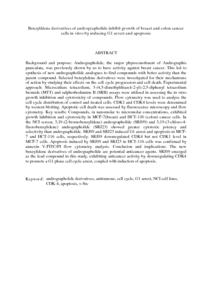Citation
Jada, Srinivasa Rao and Matthews, Charlie and Saad, Mohd Said and Hamzah, Ahmad Sazali and Lajis, Md Nordin and Stevens, M. F. G. and Stanslas, J.
(2008)
Benzylidene derivatives of andrographolide inhibit
growth of breast and colon cancer cells in vitro by
inducing G1 arrest and apoptosis.
British Journal of Pharmacology, 155 (5).
pp. 641-654.
ISSN 0007-1188
Abstract
Background and purpose: Andrographolide, the major phytoconstituent of Andrographis paniculata, was previously shown by us to have activity against breast cancer. This led to synthesis of new andrographolide analogues to find compounds with better activity than the parent compound. Selected benzylidene derivatives were investigated for their mechanisms of action by studying their effects on the cell cycle progression and cell death.
Experimental approach: Microculture tetrazolium, 3-(4,5-dimethylthiazol-2-yl)-2,5-diphenyl tetrazolium bromide (MTT) and sulphorhodamine B (SRB) assays were utilized in assessing the in vitro growth inhibition and cytotoxicity of compounds. Flow cytometry was used to analyse the cell cycle distribution of control and treated cells. CDK1 and CDK4 levels were determined by western blotting. Apoptotic cell death was assessed by fluorescence microscopy and flow cytometry.
Key results: Compounds, in nanomolar to micromolar concentrations, exhibited growth inhibition and cytotoxicity in MCF-7(breast) and HCT-116 (colon) cancer cells. In the NCI screen, 3,19-(2-bromobenzylidene) andrographolide (SRJ09) and 3,19-(3-chloro-4-fluorobenzylidene) andrographolide (SRJ23) showed greater cytotoxic potency and selectivity than andrographolide.
SRJ09 and SRJ23 induced G1 arrest and apoptosis in MCF-7 and HCT-116 cells, respectively. SRJ09 downregulated CDK4
but not CDK1 level in MCF-7 cells. Apoptosis induced by SRJ09 and SRJ23 in HCT-116 cells was confirmed by annexin V-FITC/PI flow cytometry analysis.
Conclusion and implications: The new benzylidene derivatives of andrographolide are potential anticancer agents. SRJ09 emerged as the lead compound in this study, exhibiting anticancer activity by downregulating CDK4 to promote a G1 phase cell cycle arrest, coupled with induction of apoptosis.
Download File
![[img]](http://psasir.upm.edu.my/5784/1.hassmallThumbnailVersion/Benzylidene%20derivatives%20of%20andrographolide%20inhibit%20growth%20of%20breast%20and%20colon%20cancer%20cells%20in%20vitro%20by%20inducing%20G1%20arrest%20and%20apoptosis.pdf)  Preview |
|
PDF (Abstract)
Benzylidene derivatives of andrographolide inhibit growth of breast and colon cancer cells in vitro by inducing G1 arrest and apoptosis.pdf
Download (86kB)
| Preview
|
|
Additional Metadata
Actions (login required)
 |
View Item |

